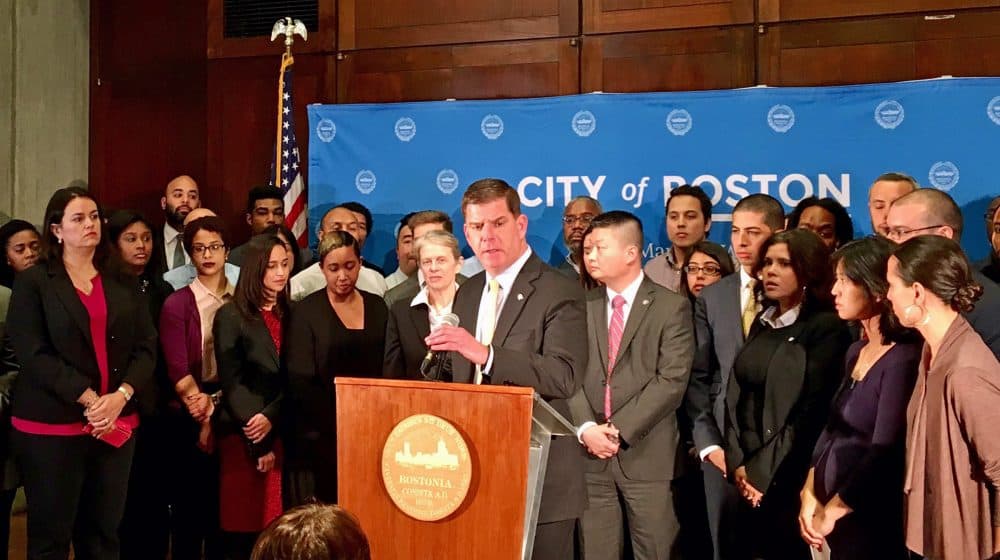Advertisement
COMMENTARY
Massachusetts Should Become A 'Sanctuary State'

Amid the turmoil of Donald Trump's early presidency, there is no doubt that noncitizens are in the administration’s crosshairs. This is consistent with candidate Trump’s anti-immigrant rhetoric. Still, few outside his inner circle could have predicted the scope, breadth and swiftness of the president’s actions.
With three executive orders in his first week, Donald Trump rocked the lives of noncitizens. His orders seem intent on walling off the United States from its southern neighbor and preventing the entry of nationals from some majority-Muslim countries. After a federal appeals court enjoined Trump's executive order banning travel from seven predominantly Muslim countries, the president signed a revised order Monday, dropping Iraq from the list of banned countries. The new order also exempts all green-card and current visa holders.
But Trump didn't reserve his animus for those outside the United States. One of his directives targets those noncitizens already within our nation’s newly erected walls by attempting to require local and state law enforcement to enforce immigration laws. The order discards with the Obama administration’s enforcement priorities — making all noncitizens fair game for immigration enforcement — and threatens to withhold federal funding from jurisdictions whose police refuse to detain any individual who sparks the suspicion of Immigration and Customs Enforcement.
Complying with these federal detention requests damages the relationship between police and noncitizen community members and their allies, and takes up police time that should be used to enforce state criminal law. It also taxes local financial resources, since cities and states are expected to foot the bill for detention. Fortunately, the Massachusetts Legislature has the means to protect its immigrant population from these federal-state immigration enforcement partnerships by passing the Safe Communities Act, sponsored by Sen. James Eldridge.
Fortunately, the Massachusetts Legislature has the means to protect its immigrant population from these federal-state immigration enforcement partnerships by passing the Safe Communities Act ...
While some of our cities, like Boston, Somerville and Cambridge, already have policies protective of immigrants, the Safe Communities Act would make all of Massachusetts a “sanctuary state." This means that state and local law enforcement and other officials could not cooperate with Immigration and Customs Enforcement, except in very limited circumstances where required by federal law. The act would keep state and local police out of the business of immigration enforcement, allowing them retain their resources to enforce criminal laws. This is also a wise policy since jurisdictions that have previously complied with immigration mandates to detain individuals have later faced lawsuits for violations of those detainees’ constitutional rights — an expense of time, money and goodwill. Experience also demonstrates that the commingling of federal immigrant enforcement is risky because immigrant residents become less likely to report crime to local and state law enforcement for fear of becoming entangled in deportation proceedings.
Economists confirm that the long-term effect of increased immigrant labor within a state leads to a rise in income for U.S.-born workers who move to new, higher-paying positions created as the labor market absorbs additional workers.
But Trump's orders are based on claims that targeting noncitizens makes America safer. Are immigrants — or so-called “bad hombres” — a threat to our country’s safety? Empirical studies tell us they are not. In fact, immigrants are less likely to engage in criminal conduct than their U.S.-born counterparts. An influx of immigration is correlated with a decrease in criminal offenses and may explain the recent reduction of the nation’s violent crime rate. Any assurances that the Trump administration will prioritize the removal of “criminal aliens” is a misnomer because that label is used to include immigrants who have been simply accused or even suspected of committing any criminal act. Even outside crime statistics, immigrants are a net gain for our communities and the nation. Economists confirm that the long-term effect of increased immigrant labor within a state leads to a rise in income for U.S.-born workers who move to new, higher-paying positions created as the labor market absorbs additional workers. Immigrant presence also reinvigorates communities by boosting housing prices and the growth of small service-oriented businesses. Further, and despite claims to the contrary, undocumented immigrants consistently pay over $10 billion annually in taxes.
If Massachusetts does become a sanctuary state, what can the Trump administration do? While the administration has vowed to withhold federal funding from jurisdictions that refuse to do its bidding by enforcing federal immigration law, the legality of that move is questionable. The 10th Amendment of the Constitution embodies the principle of federalism and state sovereignty by guaranteeing to the states powers outside those constitutionally given to the federal government. The federal government cannot force a state to use its financial and personnel resources to enforce federal laws, including immigration law, without violating state sovereignty. While the federal government possesses great leeway in its spending power, it cannot execute this power in a manner that is coercive, random and unrelated to the general welfare. Because threats to defund sanctuary jurisdictions run afoul of constitutional law and current funding designations, Massachusetts should stand firm in its support of its residents — regardless of immigration status.
Becoming a sanctuary state is the right decision for Massachusetts. On a policy level, immigrants bring diversity to our communities, strengthen our workforce, and contribute to our tax base. Legally speaking, the 10th Amendment protects our state from being forced to bend to the new president’s oppressive federal directives. In a moment when many of us are feeling powerless, there are opportunities for action — Massachusetts’ residents must call their state senators and representatives and encourage them to support the Safe Communities Act.
